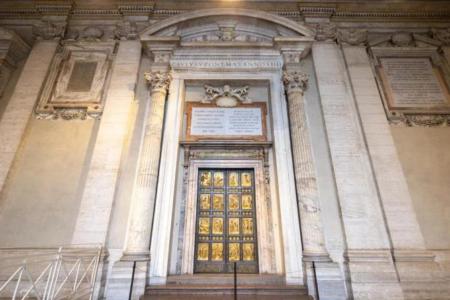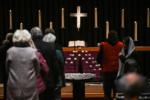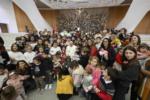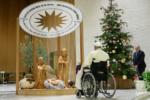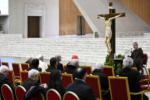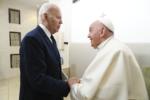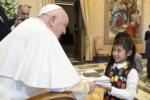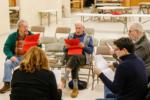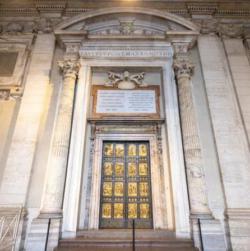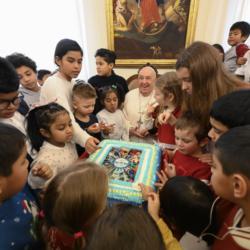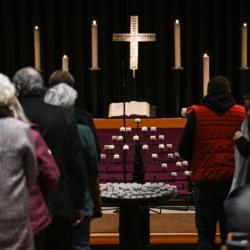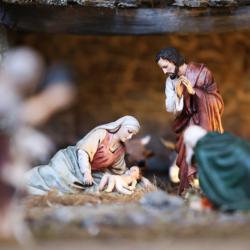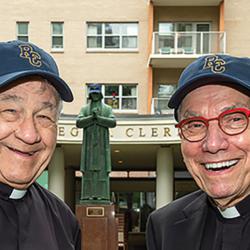Curia's role is to help bring God's blessing to the world, pope says
VATICAN CITY (CNS) -- The cardinals, bishops, priests, religious and laypeople who work in the Roman Curia are called to spread the blessings of God, but they cannot do that if they habitually speak ill of one another, Pope Francis said.
Humility is "the way of blessing, the way of God in which Jesus descends and comes to inhabit our human condition and so blesses us," he told cardinals and top Curia officials Dec. 21 during his traditional pre-Christmas meeting with them.
"With our daily work, especially the most hidden work, each of us can contribute to bringing the blessing of God to the world," the pope said. "But in this we must be consistent. We cannot write a blessing and then speak ill of our brother or sister. It ruins the blessing."
Using a cane and with an aide at his side, Pope Francis walked the length of the Hall of Blessing above the atrium of St. Peter's Basilica to reach his chair, under a tapestry of the Nativity, for the meeting. He appeared to be wearing hearing aids for the first time; at least, they were not visible in closeup photos from his audiences the previous day.
After meeting with the Curia leaders, the pope went to the Vatican audience hall where he greeted hundreds of employees of the Vatican and the Diocese of Rome and their families. He had a huge stock of large chocolate Santas, which he personally handed to each of the children.
Before reading his prepared text to the Curia officials, the pope told them, "Yesterday, the patriarch was not allowed to enter Gaza as promised. And yesterday, children were bombed. This is cruelty. This is not war."
Pope Francis apparently was speaking about Cardinal Pierbattista Pizzaballa, the Latin patriarch of Jerusalem. But the Vatican press office provided no details, and Father Ibrahim Nino, media director for the patriarchate, told Catholic News Service he could not comment.
While previous popes used the pre-Christmas meeting to review the past year, Pope Francis has taken it as an opportunity for a reflection on attitudes that help or hinder the Curia's mission of sharing the Gospel.
"Speaking well of others and not speaking badly about them," he said, "is something that concerns us all, even the pope, bishops, consecrated people, laity. In that respect, we are all equal. Why? Because it's part of our humanity."
The best way to avoid the temptation of speaking ill of others, the pope said, is by focusing on God's humility, which is seen in his choosing to enter the world as a baby and then giving his life for the salvation of sinners.
And to be humble, he said, one must take responsibility for his or her actions. As an example, he said that when one is criticized, a humble person looks for what is true in the criticism, tries to remedy it and does not lash out or try to make excuses.
Taking responsibility is "the basic attitude in which the choice to say 'no' to individualism and 'yes' to the community, ecclesial spirit can take root," he said. It is also the best way to set one's ego aside "and leave room for God's action."
Pope Francis also told the Curia officials that they should go to confession regularly, make a retreat at least once a year "to immerse yourself in God's grace," and make sure they engage in direct pastoral activity, which is especially important for young priests working in the Curia.
"In the church, the sign and instrument of God's blessing for humanity, we are all called to become artisans of blessing," the pope said. "Not just blessing others, but being artisans of this: teaching, living as artisans to bless."
Meeting afterward with the employees, including cleaners, carpenters, gardeners and artists, Pope Francis told them that "by your daily work, in the hidden Nazareths of your particular tasks, you help bring all of humanity to Christ and spread his kingdom throughout the world."
But, he said, "without prayer one cannot move forward, including in your families. Teach your children to pray."
And, at Christmastime, the pope said, "try to find some moment to gather around the Nativity scene to give thanks to God for his gifts, to ask his help for the future and to renew your affection for each other in front of the baby Jesus."
